Monday Movie: Klute, by Alexander Miller

Every Monday, we’ll highlight a piece of writing from our vaults. This review of Klute originally ran as a Criterion prediction.
There are a wide array of formative movies to have emerged from the New Hollywood movement, and three of them were directed by Alan J. Pakula; All The President’s Men, The Parallax View, and of course Klute. All the President’s Men showed us that political corruption and investigative journalism can be the springboard for a relentlessly compelling thriller; The Parallax View, a conspiracy-inspired work of sublime assassination paranoia indicated that genre and murky expressionism could work with superlative harmony. But in the noir-infused Klute, the first (and personal favorite) in Pakula’s informal paranoia trilogy (a.k.a. Pakula’s Political Paranoia Trilogy) the director pins his aesthetic tenor in creating a tonally refined amalgam of noir conventions with his penchant for thematic distance, dark compositions, deliberate framing schemes, and icy interiority.
While there’s the throughline of artistic strengths with Pakula’s Political Paranoia Trilogy, what with Gordon Willis’ characteristically dark cinematography. Klute belongs to the informal family of revisionist murder mysteries or neo-noirs; it starts with Vertigo, expands into international territory with Blow-Up, and hit an apex with Klute and Francis Ford Coppola’s masterpiece The Conversation. Queasily enthralling and saturated with moody atmosphere, these works are an exercise in melancholic detachment. Klute is one of the great films that defined an era in cinema, but it’s never laden with the same level of praise one would devote to New Hollywood favorites such as Easy Rider, Midnight Cowboy, or The French Connection. In the way that more recognizable style seems to trump restrained style in the memories of cinema-goers, but in the larger conversation of timeliness titles like Klute hold up better as the years go, with Pakula avoiding cliches and trendy flourishes his work has aged well.
Klute is very much the work of an auteur director, but this a film that is also defined by its performances. Jane Fonda is rightfully iconic; she’s not a damsel in distress or any other feminine cliche. Fonda exerts this natural energy, she’s not under or overacting, as Bree, she’s sustained, realized but never bigger than life, and this sort of control is in perfect pace with Pakula’s method. Donald Sutherland is on a similar frequency but his titular detective is a few paces behind Bree, and in contrast, as well as in concert with the genre it’s rooted in, the detective character isn’t fully informed, because narratives are at their best when they engage us, and that’s one of the most essential lessons Pakula retains.






























